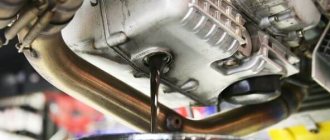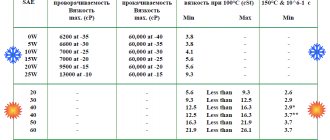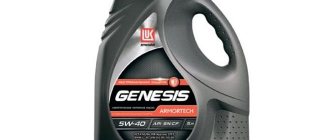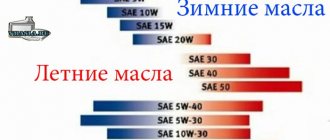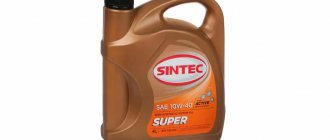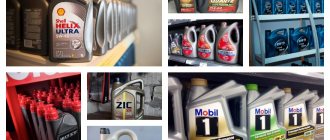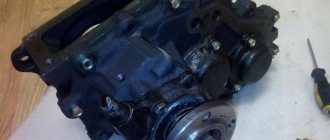Looking at the abundance of goods in a car store, any driver asks the question: “What is the difference between oil in a tin can and oil poured into cans?” This is not an idle question, because any motorist knows: motor oil must be of high quality, guaranteeing the safety of the engine - the heart of the car.
Most of the largest manufacturers, including the Toyota automaker, produce motor oils in two types of containers: cans and plastic cans. Let's find out more about Toyota 5W - 30 oil in a tin can, which is a representative of the ultra-premium class.
Technical specifications
Type of oil
This motor oil belongs to the synthetic group, that is, it consists only of petroleum distillation products obtained in the usual way or using advanced hydrocracking. As a result, a base is produced with stable parameters.
Subsequently, a package of additives is added to it, giving the oil certain properties:
- stability of performance characteristics;
- optimal ratio of viscosity and fluidity;
- high quality;
- protection of engine parts from wear.
Interesting! The Toyota Motor Corporation was founded by Sakichi Toyoda to develop, manufacture and modernize looms - this is what is reflected in the car's corporate logo: a curved loom needle with thread threaded through it.
The founders of the concern paid special attention to the smooth running of the machines, their silent operation and the safety of parts, so they developed a special composition of lubricant oil for them. Some of its components are still used today - in motor oil produced by the company for its cars.
Thus, the production of looms marked the beginning of the family business, and the capital created formed the basis for the production of machines that became a symbol of speed, quality and status.
Tara
Tin can with a capacity of one or four liters.
The main advantage of metal containers is a high degree of reliability in terms of protection against counterfeiting. It is quite easy for unscrupulous manufacturers to produce or purchase plastic canisters, which cannot be said about tin cans.
It is for this reason that the Toyota concern, which puts the quality and safety of its products first, produces original motor oils mainly in containers made of metal.
Depending on what type of production is used, the oil is marked “SL” or “SM” on the can. In the first case, it is completely synthetic, and in the second, it is made using hydrocracking.
Quality class
SN (according to API classification).
GF - 5 (according to ILSAC classification). This class is assigned by the International Committee for Certification and Standardization of Motor Oils only to those products that contain additives, the combination of which allows for easy engine starting and efficient operation in a wide temperature range.
This oil belongs to the highest class, meets the most stringent requirements of auto giants and is suitable for the following vehicles and units:
- passenger cars and light trucks of Russian and foreign production;
- gasoline four-stroke engines and diesel engines;
- turbocharged engines, conventional engines, including those with particulate filters.
The product is suitable for vehicles operating in any conditions, including difficult ones.
Important! In Japan, as well as throughout the world, this oil is purchased not only by owners of Toyota cars, but also by owners of cars of other brands.
Viscosity
5W - 30. The oil is all-season, so it does not require replacement before the onset of summer or winter. It allows you to easily start the engine at temperatures from minus 35°C to plus 30°C.
Selected viscosity values:
- kinematic viscosity (at a temperature of 40º C) – 62.85 square mm/s;
- kinematic viscosity (at a temperature of 100º C) – 10.59 square mm/s;
- dynamic viscosity - 5772;
- oil pour point - minus 40°C;
- viscosity index - 159.
Base number
It is equal to 5.9. This makes this engine oil especially effective when operating a vehicle on high-quality fuel.
All about Toyota 5w30 oil
Long-term research and development by the company’s best specialists led to the fact that high-tech oil began to be used not only by owners of the Toyota brand, but also by owners of “competitor cars.” So what do we get by buying motor lubricant from a Japanese manufacturer? First of all, quality, which is confirmed by global product control companies. The second is, of course, a guarantee for the long service life of our engine. Due to constant quality control of manufactured products, you can always be sure that the engine will not let you down.
Original Toyota oil 5w30
5w30 oil undergoes processing, after which it is provided with additives for better viscosity, minerals for engine cleaning and oil seal consistency. Helps eliminate carbon deposits and soot. Guarantees easy engine starting at low temperatures. Has remarkable performance characteristics. Affects fuel costs, reduces consumption. The engine oil change period for turbocharged engines is up to 5000 km, for non-turbocharged engines 10000-12000 km.
Original Toyota oil 5w30: parameters
— has the properties of low-temperature viscosity. During critical temperatures (-35°C/+30°C), the manufacturer provides a guarantee for the start and uninterrupted operation of the vehicle.
— antioxidant components prolong engine operation for many years;
- performs the function of compaction;
— provides optimal engine cleaning;
— the liquid is excellent for gasoline (including turbocharged) and diesel engines;
— ensures stable operation of all internal combustion engine parts.
Benefits of the oil
Achievements in the oil refining and petrochemical industries, modern technologies and high-quality raw materials make it possible to produce motor oil with high performance characteristics.
- Protection of engine parts from wear (this also applies to engines with high mileage).
- Increasing their resource.
- Fuel economy, including in large heavy crossovers.
- Maintaining operating parameters throughout the entire period of oil operation.
- Long interval between its replacements.
- Effective lubricity, which makes it possible to use this oil as a sealant and protect engine parts, including those made of polymers, for example, oil seals.
- Excellent cleaning ability of the product.
Important! The high detergency of this oil allows you to save effort, time and money when replacing it, since there is no need to wash engine parts from carbon deposits and other deposits.
Original oil and counterfeit
The popularity of Toyota cars and the demand for consumables for them have led to numerous counterfeits of Toyota motor oil, including 5W30 viscosity lubricant. This became possible due to the fact that Europeans produce it in plastic cans. It is the discrepancies between the original and counterfeit containers that make it possible to identify a counterfeit.
In order to avoid falling for scammers, you should follow a few simple rules.
- You should never be tempted by a product that is too cheap, which is supposedly offered at a promotion or is announced as a sale. This is the first sign of a fake. Original lubricant cannot be cheap.
- You should not purchase lubricating fluid on the market from unknown sellers. There is a much higher chance of getting a fake instead of the original. It is better to buy only in large specialized stores or from official dealers. Then the likelihood of getting a fake is significantly reduced.
- When purchasing, you should inspect the canister very carefully. As a rule, counterfeit products are clearly of worse quality, which is noticeable to the naked eye.
We hope that our advice will help you avoid purchasing low-quality lubricant that can destroy an expensive motor in one fill.
Reviews from car owners
Drivers leave mostly positive reviews. This is what the overall picture looks like:
Here are some reviews:
- on the relationship between cost and quality of oil:
- about engine operation when using this oil:
- about the quality of the oil:
Mixed motor oils
The number of manufacturers of universal motor oil is increasing every year. But should you trust unknown brands? Of course, it is better to stick with a popular and high-quality oil rather than experiment with your engine every time. Therefore, all recommendations and preferences are given to Toyota 5w30 sn cf engine oil.
Oil Toyota SN/CF 5w30
The new generation universal oil is in great demand on the world market. This is the latest generation of high-tech synthetics. Suitable for both gasoline and diesel Toyota engines.
Read also:
- Do-it-yourself Toyota CALDINA repair - video
- How to properly adjust the Toyota Corolla transmission
If we classify this oil according to SAE, then it can be classified as an all-season type. The 5w30 designation indicates a wide range of oil viscosity. Can also be used for other brands of cars that meet viscosity requirements. According to ACEA sn cf received classification A1/B1. The developers also took care of other types of engines. By producing a wide range of improvements for this type of oil according to ACEA - A5/B5/C5, you can choose exactly what you need for your car.
Universal mixed-type motor oil serves to prevent carbon deposits on the cylinder walls, promotes optimal operation of the internal combustion engine and guarantees easy engine starting in cold weather. When buying oil, pay attention to its originality!
Specifications and approvals
All Toyota 5w-30 series products are considered high-quality, ultra-premium lubricants, as evidenced by their being assigned a GF 5 rating according to the ILSAC specification and an SN rating according to the API specification.
ILSAC GF 5 class is the highest rating assigned by the International Committee for Certification and Standardization of Motor Oils, indicating that the oils in this series contain an advanced formula of additives that facilitate easy engine starting and optimal functioning over wide temperature ranges.
API SN class is assigned to products with improved performance characteristics that allow the use of oil as a sealant (characterizes reliable protection of oil seals and gaskets).
Such high performance was achieved thanks to improved hydrocracking technology in the production of base fluid, which makes it possible to obtain a base with stable characteristics even before adding an additive package to it.
Therefore, Toyota 5w-30 oil has SN/GF 5 approvals, which meet the most stringent requirements of all global automakers.
In Europe, as in North America, Toyota 5w-30 engine oil has earned the highest ratings from experts in the field of motor oils, having undergone a number of successful trials and tests.
Toyota 5w-30 engine oil is available in iron cans
How to spot a fake
Real Toyota lubricant is poured by the manufacturer only into four-liter tin jars of red-silver color. The packaging must indicate the manufacturing company and the country of manufacture (Japan, and not, for example, Germany). It is worth knowing the meaning of the labels, because oils of different origins can differ greatly. 5w30 SL is pure synthetics, but 5w30 SM is a hydrocracking product obtained by mixing mineral water with a synthetic lubricant. The company does not produce completely mineral oil.
External signs of original canisters
Drivers should know not only which oil is better, but also how to distinguish the original product from a fake. The original has the following features:
- Canister. The original container is made of smooth gray material, with high-quality seams without teeth. Any difference from the standard, abrasions, transparency, depressions indicate a fake product. Pay attention to the measuring line - on fakes it is uneven, the symbols are poorly stamped;
- Label. No matter what oil the Japanese manufacturer produces, he will not skimp on printing. In view of this, the image on the original has clarity, saturation, brightness, small elements are easy to see;
- Lid. The original is closed with a unique embossed stopper and arrows that indicate the direction in which it should be unscrewed. There are no gaps. Fake lubricant is closed with smooth plugs, without marks, there may be a small gap between the neck of the container and the lid.
Toyota 5w30 oil is a whole line of synthetic motor lubricants of the highest quality from a renowned manufacturer. There is no doubt that the products are constantly tested and certified, since each oil has a number of regalia and approvals according to the main classifiers. Another interesting thing is that any engine oil from the Toyota 5w30 series undergoes triple standardization, unlike its European counterparts.
A Japanese product is first tested for quality at ILSAC, which in turn is a branch of the Petroleum Institute of America, and then re-tested by API. In addition, all Toyota oils are tested for ACEA, as they are also adapted for European cars.
Despite the fact that the famous automaker Toyota put its name on the consumable, the direct manufacturer of the lubricant is EXXON Co, more familiar to consumers under the abbreviation ESSO. This transnational giant produces lubricants not only for Toyota, but also for most of the world's leading oil producing companies, working with them on special conditions.
Basic information
Original Toyota 5W30 oil is made from petroleum using catalytic hydrocracking technology. In the international classification, the liquid is in group 3. In other words, the Japanese do not classify oil as a specific type. SAE decided that this product can be classified as synthetic.
However, this synthetic product is distinguished by its thermal-oxidative stability. Lubricant obtained by hydrocracking has a lower index, so it requires more frequent replacement.
Toyota 5w30 fluid is mainly used in gasoline engines. The line of such products also includes Toyota 5w30 diesel oil.
Toyota products are manufactured at factories located in Japan itself, as well as in European factories.
The lubricant supplied in an iron can is a Toyota product 5w30 sn/gf-5 and is produced only in Japan. Europeans sell this oil in ordinary plastic cans labeled Toyota 5w30.
The difference is that the lubricant from Japan corresponds to the SN category and this is indicated on the can
. Let me remind you SN For gasoline cars 2011 and above. And the lubricant from Europe corresponds to the SL category - for gasoline engines produced from 2001 to 2004.
But all these oils are original and intended for Toyota cars.
For more information about the differences between oil categories, watch this video
Technical characteristics of Toyota SN 5w30 GF 5
When the temperature reaches 40 degrees, the kinematic viscosity is 62.86 mm2/s. However, this value is a reference value and is not standardized.
After raising the temperature to 100 degrees, the kinematic viscosity drops to 10.59 mm2/s. The viscosity index reaches 159 units. Of course, it is far from ideal, but for a lubricant obtained by hydrocracking, this indicator can be considered very good.
Asian oils are designed for high quality fuel, so they have a low base number (8.53 mg KOH). For domestic conditions, this parameter is considered low, so an oil change must be carried out after 6-8 thousand mileage. During this time, the volume of the alkaline environment, neutralizing harmful formations, will decrease.
The oil contains 0.97% sulfated ash. This is slightly more than lubricants classified as Mid SAPS. The liquid begins to solidify when the temperature drops below minus 40 degrees.
In other words, at a temperature of minus 30 degrees, the oil will retain its fluidity and the engine will start quickly. The flow rate reaches 5772 mPas. It fully complies with the standard, which should not exceed 6600 mPas.
Test results for Toyota 5W-30 API SN ILSAC GF-5 engine oil
| Indicator name | Units | Test method | Regulatory requirements | Actual values for sample |
| Kinematic viscosity at 40 °C | mm2/s | GOST 33 | no data | 62,86 |
| Kinematic viscosity at 100°С | mm2/s | GOST 33 | 9,3-12,5 | 10,59 |
| Viscosity index | — | GOST 25371 | no data | 159 |
| Base number | mg. KOH for 1 g. | GOST 30050 | no data | 8,53 |
| Acid number | mg. KOH for 1 g. | GOST 11362 | no data | 1,53 |
| Sulfate ash | % | GOST 12417 | no data | 0,97 |
| Pour point | GOST 20287 | no data | minus 40 | |
| Apparent (dynamic) viscosity, determined on a cold spin simulator (CCS) at minus 30°C | mPas | ASTM D 5293 | 6600 no more | 5772 |
| Mass fraction of elements: | mg/kg | ASTM D 5185 | ||
| molybdenum (Mo) | —//— | —//— | no data | 44 |
| phosphorus (P) | —//— | —//— | no data | 907 |
| zinc (Zn) | —//— | —//— | no data | 1028 |
| barium (Ba) | —//— | —//— | no data | 0 |
| boron (B) | —//— | —//— | no data | 2 |
| magnesium (Md) | —//— | —//— | no data | N 12 w |
| calcium (Ca) | —//— | —//— | no data | 2608 |
| tin (Sn) | —//— | —//— | no data | 0 |
| lead (Pb) | —//— | —//— | no data | |
| aluminum (AI) | —//— | —//— | no data | 1 1 1 |
| iron (Fe) | —//— | —//— | no data | |
| chromium (Cr) | —//— | —//— | no data | 0 |
| copper (Cu) | —//— | —//— | no data | 0 |
| silicon (Si) | —//— | —//— | no data | 10 |
| sodium (Na) | —//— | —//— | no data | 1 |
| potassium (K) | —//— | —//— | no data | 0 |
| Water content | —//— | —//— | 10..40 | 10 |
| Ethylene glycol content | IR Units | ASTM E 2412 | 0..1 | 0 |
| Content of oxidation products | —//— | —//— | 6..12 | 10 |
| Content of nitration products | —//— | —//— | 3..8 | 4 |
